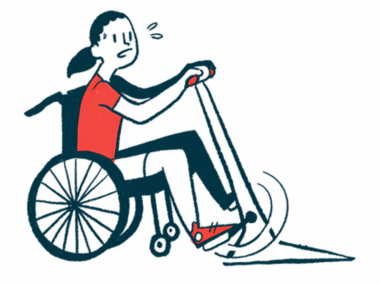#MSVirtual2020 – Long-term Aubagio Use Seen to Lower Relapse Risk for Children
Written by |

Continuous treatment with Aubagio (teriflunomide) can safely lower the risk of relapses and disability progression in children with relapsing forms of multiple sclerosis (MS), according to interim data from the open-label extension of a Phase 3 trial.
These findings were detailed at MSVirtual2020 by Tanuja Chitnis, MD, an associate neurologist at Brigham and Women’s Hospital and a professor of neurology at Harvard Medical School in the oral presentation, “Teriflunomide efficacy and safety in pediatric patients with relapsing forms of MS: Interim analysis of open-label TERIKIDS trial extension.”
Aubagio, an oral therapy marketed by Sanofi Genzyme, is approved in more than 80 countries to treat adults with relapsing forms of MS. It is thought to work by restricting the expansion and maturation of immune cells known to drive inflammation in MS.
According to Chitnis, “pediatric-onset MS represents 2%-5% of all MS cases, but treatment options for pediatric patients with relapsing forms of MS are limited.”
Gilenya (fingolimod, marketed by Novartis) is currently the only approved MS therapy for children, ages 10 and older, in the U.S. and the European Union.
An ongoing and long-term Phase 3 trial, TERIKIDS (NCT02201108) is assessing the safety and effectiveness of Aubagio at reducing disease activity and progression in children and adolescents, ages 10–17, with relapsing forms of MS.
TERIKIDS opened with pediatric patients randomly assigned to either Aubagio daily — at a dose equivalent to 7 mg in adults during the first eight weeks, followed by 14 mg — or to a placebo for up to 96 weeks (two years).
After completing this treatment period, patients had the option of enrolling in an open-label extension study, either continuing or starting treatment with Aubagio for an additional 96 weeks.
Those assigned to the placebo in the original trial and experiencing relapses accompanied by new MS lesions were eligible for early entry into the open-label extension, where all are given Aubagio at a weight-based dose equivalent to a 14 mg dose in adults.
Previous data from TERIKIDS showed that Aubagio lowered the risk of MS relapses by 34% in the first 96 weeks of treatment, and prolonged the median time to the first confirmed relapse to 75.3 weeks compared with 39.1 weeks in the placebo group. However, this difference was not statistically significant.
Aubagio also reduced the risk of high disease activity by 43% against a placebo, significantly prolonging the median time until a first sign of disease activity — 72.1 weeks for those being treated, and 37.0 weeks for those on a placebo. This result was statistically significant.
Significant reductions were also seen in some secondary trial goals, including the number of new or enlarging MRI lesions in children on Aubagio compared with a placebo — a relative reduction of 75% in T1 lesions (active inflammatory lesions) and of 55% in T2 lesions (both old and new lesions).
At the meeting, Chitnis presented new interim data from the trial’s open-label extension. As of the cut-off date of Nov. 27, 2019, 100 (91.7%) patients assigned to Aubagio in the main study, and 52 (91.2%) who were assigned to a placebo, were enrolled and being treated.
As of the cut-off date, 30 patients had completed the extension study and 34 had discontinued. The remaining 88 are still being treated with Aubagio.
Those children on continuous Aubagio treatment in both parts of TERIKIDS had a 39% lower risk of having relapses compared with those who switched from a placebo for its extension part, data showed. This difference was not statistically significant.
Patients on continuous use of Aubagio also had a lower risk of experiencing sustained disability progression for 24 weeks (six months), compared with those moving to Aubagio in the extension study. This difference was also not statistically significant.
The number of new or enlarging T2 lesions, as well as the number of active T1 lesions, were both significantly lower among continuous treatment patients that among those earlier on a placebo: 6.3 vs. 13.0 with T2 lesions per MRI scan, and 1.9 vs. 4.2 with active lesions per MRI scan.
The incidence of any adverse event during the extension study was also found to be lower (68.0%) among those given continuous Aubagio treatment, compared with those initially on a placebo (82.7%).
Likewise, the proportion of patients with serious adverse events during the extension study was lower among those continuing with Aubagio (10.0%), than among those who switched (25.0%).
A total of eight children — two in the continuous Aubagio group and six in the placebo/Aubagio switch group — discontinued treatment due to side effects during the extension study. These side effects were high levels of liver enzymes (indicative of liver damage and inflammation; five patients), peripheral neuropathy (one patient), and pancreatitis (two patients).
No deaths were reported over the course of TERIKIDS or during its extension study.
“During the combined double-blind and open-label periods, clinical relapses and the risk for 24-week sustained disability progression were numerically lower in the teriflunomide [Aubagio] continuous arm, compared to the placebo to teriflunomide switchers,” Chitnis said.
“Overall, teriflunomide was well tolerated and had a manageable safety profile in pediatric patients with relapsing MS,” Chitnis concluded.
This study was supported by Sanofi.





